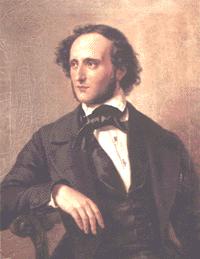![Piano's Solo Corner [Image]](piano8b.gif)
![Piano's Solo Corner [Image]](piano8b.gif)

| Date/Place of Birth: | 3 February, 1809 in Hamburg, Germany. |
| Personality: | A brilliant child prodigy. Mendelssoh's gifts were phenomenal -
a good painter, had wide literary and philosophy knowledge, a superb pianist, an inspiring conductor, a good violinist,
and a skilled organist. He was therefore an object of envy and admiration in Europe.
Came from a famous, wealthy and cultured Jewish family, Mendelssohn was a well-mannered boy. Yet his family loved music so much and he was no doubt musically talented. As a child, he knew all nine Beethoven symphonies by heart and even played them on the piano. His memory was therefore exceptional. Like Mozart, Mendelssohn could hear a piece of music once and never forget it. |
| Piano-Playing Style: | By the age of nine, Mendelssohn played the piano in public for the first time. He played piano 'politely' and
rarely banged the keyboard like the violent Beethoven. His playing style represented the pure, classic style as opposed to romantic thundering of Liszt
style or the rubato effects of Chopin style. This indicates that Mendelssohn's playing was always clear, elegant, precise, logical and with little use of
the pedal.
A music critic's remark on Mendelssohn's début in England in the year of 1829 was: This evidently showed that the listeners were enchanted by Mendelssohn's charming playing. |
| Music: | The qualities, which attracted many music lovers - qualities of grace, vivacity, and refined but not profound emotional
thought - were expressed with remarkable happiness in most of Mendelssohn's music.
Unlike the romantic music, Mendelssohn's music was very much relaxed, clear and fresh as his music was mainly diatonic, contained very few dissonance and simple melodies. One would find out that the gentler and happier side of human experience; and the beauty of nature were mostly reflected in his music. In conclusion, Mendelssohn's colourful and joyful music was undoubtedly loved by music lovers all around the world. |
| Composing Habit: | Mendelssohn started composing when he was just a teenager. His maturity in compositions was developed very quickly. A fine example would be
Octet in E flat for Strings, a work of 16-year-old boy, surpassing anything Schubert or Mozart composed in their teens.
Generally, Mendelssohn was a cautious composer. He always used the strict classical form to fit his musical ideas like Brahms. His clear outline and well-organised form; his rhythm was very regular and precise; the phrases were balanced equally; the melodies he composed were always tender and sweet; the modulations were done safely without much exaggeration; the polyphony he applied to add exhilaration in his music instead of increasing intense. Because of his 'safety-first' and classical composing style, some people may find his music perfect and miraculous; while others may find his music too conservative and lacking of richness and deep expressions. In addition, the sights and sounds of many countries visited by Mendelssohn inspired him very much. As a regular habit, he always conformed these experiences into music. Examples of his fine works were Symphony no 3 'Scottish', Symphony no 4 'Italian', Songs Without Words for piano etc. |
| Mendelssohn's Quote: | "By God, I play better here than in Berlin, and that is because the people listen better. Don't take that as a conceited comment, but it is exalting when you feel
that you succeed and give others pleasure," Mendelssohn's letter to his family, June 1829 - telling that he was popular in London "Even if, in one or other of them, I had a particular word or words in mind, I would not tell anyone, because the same word means different things to different people. Only the songs say the same thing,
arouse the same feeling, in everyone - a feeling that can't be expressed in words," |
| Mendelssohn's Death: | In the middle 1840's, Mendelssohn carried out several duties actively - composer, conductor, pianist, teacher, administrator, family man and traveler. Despite his extreme
exhaustion, he still worked constantly and enthusiastically. Therefore, his health deteriorated greatly.
The worst blow came in May, 1847 when his sister Fanny died suddenly. Mendelssohn was so sad and suffered a mild stroke that left him partially paralyzed. The unique genius finally died on 4 November, 1847 in Leipzig, at the age of 38 only. |